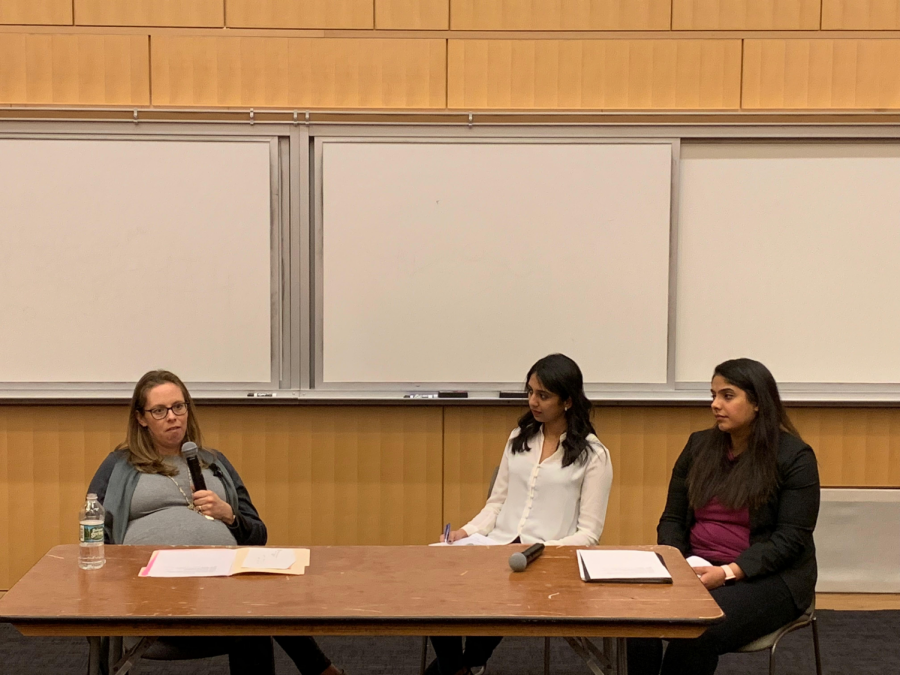Neurala COO shares insight on gender equity in STEM with NU students
Heather Ames Versace (left) discusses gender equality in the STEM field with moderator Rishika Dawkar (center).
January 20, 2019
“If roughly 50 percent of drivers in the United States are women, then why is there nowhere in the car for the driver to put her purse?”
Heather Ames Versace posed this question to an audience of Northeastern students Friday night. Versace, co-founder and chief operating officer of the artificial intelligence company Neurala, was invited to speak on the changes to the industry and her success as one of CloudNOW’s “Top 10 Women in Cloud.”
The answer to that question, she said, is that there aren’t enough women in the engineering industry. People most readily solve the problems they’re familiar with, she said, and the ratio of men to women in STEM and engineering is, in her words, awful.
In 2014-15, only 19.9 percent of bachelor’s degrees in engineering were awarded to women, according to a study by Brian Yoder of the American Society for Engineering Education. Only 14.8 percent of computer science degrees went to women. The only discipline in which the women’s share of degrees approached 50 percent: environmental, at 49.7 percent.
“We run the risk of building technology that doesn’t meet the needs of a wider population,” she said of her field’s undiversified talent pool. She also cited a lack of adequate parental leave; during her time working at Boston University, the policy was for new parents to use up their remaining sick days and then go unpaid.
“How are mothers, how are any women supposed to get into this field with these policies?” she said during the talk. “This is supposed to be a major university. These are things they can easily do better.”
The talk was organized by Husky Systers Code, a group founded about two months ago primarily to give female tech students the chance to promote each other and learn from one another. Rishika Dawkar, a second-year graduate student studying information systems, helped start the group and moderated Friday’s session.
Dawkar emphasized the need for more women in the tech and engineering industries and pointed out more women entering the field will make it even easier for new women to gain entry.
“You understand the needs of people like you,” said Dawkar, who wants to go into data management and analytics. “I’m a nervous person, and I think twice before doing things. Having women in the workplace who understand the problems faced by other women is so important.”
Versace has three children and is expecting a fourth. She said the ideal of “having it all” and perfectly balancing work and home life is impossible in tech.
“The only way to do it is to mix up the parts of your life,” she said. “Sometimes my kids end up in the office. One time I looked up and my daughter was sitting on a Northeastern co-op’s desk watching cartoons while he was coding.
“Most days I’m failing either at work or at home. But big-picture I’m succeeding in both. You can’t just look at it on a day-by-day basis.”
Yashashri Shiral, a first-year graduate student studying information systems, came to the talk because Versace embodies many of her career aspirations.
“She runs her own company, she has three kids, she’s pregnant. She is kind of someone I look up to,” Shiral said. “I wanted to come here to find out what it’s like. What do they expect from us?”
Asked if it seems like a tall task to enter a field so disproportionately filled with men, Shiral said, “I don’t look at it that way. I’m used to this concept.” She got her undergraduate degree in India, where her classes were mostly filled with men. “I just look forward to what I want to learn.”
Versace shared many insights on the technical side of the business. She remarked that a few years ago, she and her colleagues would be instructed to remove AI from their grant letters because it wasn’t marketable, whereas today companies come to them asking for AI solutions that require much simpler fixes.
She said it’s important to get to know people, because in an AI company, “at the end of the day we’re still people.”
On the issue of data security, she distanced her firm from Google, saying they prefer “smaller data play” because it’s easier to get meaningful trends when you’re not collecting every data point imaginable.
“We’re not feeling the pressure” that larger companies are facing on privacy, she said. “But we’re trying to get ahead of the game. We’ve learned that customers really don’t want any of their data to be shared. We work with our clients so they can protect their own data.”
She said her work is still in the service industry, walking companies through the implementation of their products. But she hopes for that to change as the field advances. “We want it to move from hand-holding to enablement.”
Of more than two dozen students in attendance, the vast majority were women. They happily took a group picture with Versace after the talk. They didn’t sound daunted by the historical gender ratio in the industry.
“I’m not scared, I just look at it as a challenge,” Dawkar said.


















